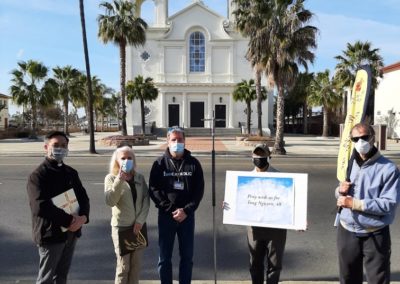Restorative Justice
What is Restorative Justice:
Restorative justice is a philosophy and an approach that looks at conflict and harm through the lens of all impacted and works collectively to bring them into right relationship with God and one another.
The practices of restorative justice are centuries old. They were present in the days of the early church and reflect the most basic tenets of Catholic Social Teaching:
Human life and dignity are sacred.
- Our participation in community is a responsibility and right.
- We are called to strengthen and nurture the family.
- We respect human rights.
- The needs of the poor and vulnerable come first.
- We pursue peace and justice.
- We care for all of God’s creation.
Restorative Justice seeks to hold offenders accountable even as it opens paths to healing, especially with victims. And it addresses the needs of everyone impacted by crime: victims, offenders, families, communities, and those working in the criminal justice system.
It’s been pointed out by legal scholars, sociologists and religious leaders that our criminal justice system is grounded in retribution. Those convicted of crimes — especially violent acts — are to be locked away and punished by the government.
Besides cooperating with the police and testifying in court, victims play no further role in the adversarial process. And rehabilitating offenders, at best, is an afterthought for the two million men and women incarcerated in the United States today.
Starting with their 2000 pastoral letter “Responsibility, Rehabilitation, and Restoration: A Catholic Perspective on Crime and Criminal Justice,” U.S. bishops have advocated for a more humane approach called “Restorative Justice” to repair the harm caused by criminal behavior to the extent possible. The growing social justice movement encourages victims, offenders and their impacted communities to fully participate in the healing process through victim/offender dialogue, restitution, victim and ex-offender assistance, sentencing circles and community service.
Crime is viewed as an offense against human relationships, so the focus is on healing. By participating in victim-centered programs, offenders see firsthand the impact of their crimes.
Restorative justice is about addressing the rights and needs of everyone impacted by crime in a balanced way — victims, offenders, and the community
Restorative Justice Ministries
 If you wish to be part of the Restorative Justice team with the ministries below, please contact:
If you wish to be part of the Restorative Justice team with the ministries below, please contact:
Michael Shirley, Associate Director for Life, Justice and Peace. Tel: 408-983-0131 | email: michael.shirley@www.dsj.org
Serving Santa Clara County’s two Adult detention facilities and two Youth detention facilities.
Praying for the souls lost to violent crime and their families.
Through Catholic Charities, journeying with those who have been released from custody back into society, along with their families.
The primary focus of the Detention Ministry is to communicate the GOOD NEWS of God’s unconditional love and mercy for all, and through the Diocese of San Jose, to provide a Catholic pastoral presence that reflects a sensitivity to the ethnic and cultural differences of the thousands of men, women, and youth incarcerated in our county jails and juvenile facilities.
Thank you for your interest in Detention Ministry. This ministry needs dedicated Christians who want to serve the men and women that are incarcerated here in the Diocese of Santa Clara or Santa Clara County.
The steps necessary to become a minister in jail are listed below:
-
- Discernment. You must make sure that you are ready for this ministry. Through prayer and dialogue with a priest, deacon or lay person it will become clear if you are ready to move forward.
- Letter of recommendation. You must talk with your pastor and tell him what your plans are. If he agrees that you are ready you can request that he writes you a letter of recommendation.
- Verification. I will review the letter and contact your pastor to verify its contents.
- Notification. Once verified I will make an appointment so we can meet.
- Training. I will arrange a date and time that we can meet either on Zoom or in person to go over the manual. It gives us a chance to get to know one another.
- Clearance forms. There are three parts to this process. Clearance forms, Fingerprinting, and an online PREA class.
- Submission. Once the clearance forms have been completed send them to me.
- Patience. Once clearances have been turned in, it can take up to 2 months for clearances to be approved.
- Once approved. You will be assigned a mentor to minister with until you feel comfortable to be on your own.
Every year the Street Victim Ministry host a series of prayer walks in the streets of San Jose.
If you wish to attend one of our prayer walks, look for our announcements of dates and locations at the website’s Events Calendar.
If you are interested in more information about the Street Victim Ministry or in joining the ministry prayer team, please contact Michael Shirley.
Below is a community of the Street Victim Ministry members that have prayed at various streets in the city of San Jose.





